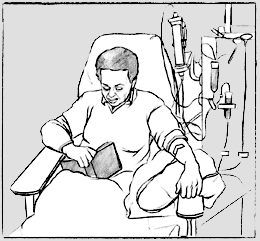Nephrotic Syndrome
Prognosis:
The outcome of Nephrotic Syndrome varies and is largely dependent on the underlying cause. Some patients may have a spontaneous recovery, while others worsen despite aggressive, specific therapy. The majority of children "outgrow" this disease in their late teens or early adulthood.
The nephrotic disease is marked by relapse and recurrence. On average, the chances of recurrence or relapse of Nephrotic Syndrome are as high as 50-75%. The attacks are more frequent in the first one to two years after the Nephrotic Syndrome begins.
Complications:
Nephrotic Syndrome is associated with renal failure. In these cases, the kidneys may gradually lose their ability to filter waste products and excess water from the blood. The edema that is present in the legs may also be occurring in the kidney tissue itself and can interfere with the kidneys’ ability to clean the blood.
Renal failure can either be gradual (CRF) or acute (ARF). If kidney failure occurs, the patient will need dialysis or a kidney transplant.
 In some patients with Nephrotic syndrome, a hypercoagulable state is also seen i.e. a condition in which the blood abnormally overcloys. Hence such patients are at risk of developing a blood clot in the legs or in the blood vessels of the kidneys (renal veins). Blood thinners are given to such patients to prevent this complication.
In some patients with Nephrotic syndrome, a hypercoagulable state is also seen i.e. a condition in which the blood abnormally overcloys. Hence such patients are at risk of developing a blood clot in the legs or in the blood vessels of the kidneys (renal veins). Blood thinners are given to such patients to prevent this complication.
Interestingly, timely administered homeopathy medicines have the potential of avoiding these grave complications. In realism, with homeopathy treatment, the chances of relapse and recurrence lessen considerably. In those patients who are already on dialysis, homeopathy can reduce the frequency of dialysis and even in some cases may abolish the need for it entirely.
Written & Approved by-
Dr. Rajesh Shah
M.D. (Hom.)